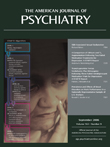Dr. Spiegel Replies
To the Editor: What’s in a name? Dr. Nakdimen concurs that dissociative identity disorder is underdiagnosed, but criticizes the current DSM-IV-TR nosology for removing multiplicity of identity from the name and for not including hiddenness among the diagnostic criteria, which is more like the DSM-III criteria. Undoubtedly, there are multiple ways of naming and describing the identity disturbance of such individuals, some emphasizing fragmentation, others the proliferation of partial competing identities. The diagnostic criteria themselves make it clear that the problem is the presence of “more than one identity or personality state.” The current title emphasizes the failure of integration rather than multiplicity of identities, which has the advantage of indicating that the “personalities” are not really personalities but rather fragments of identity indicative of a damaged personality. It is true that hiddenness is not explicitly mentioned in the diagnostic criteria, but that is also characteristic of many psychiatric symptoms, such as delusions in schizophrenia, which are sometimes jealously guarded and only mentioned in response to specific inquiry. Clearly, the exact title of the disorder will again be explored, and hopefully more attention will be paid to the diagnosis and treatment of dissociative disorders. They have been with us for a long time. A rose is a rose is a rose.



